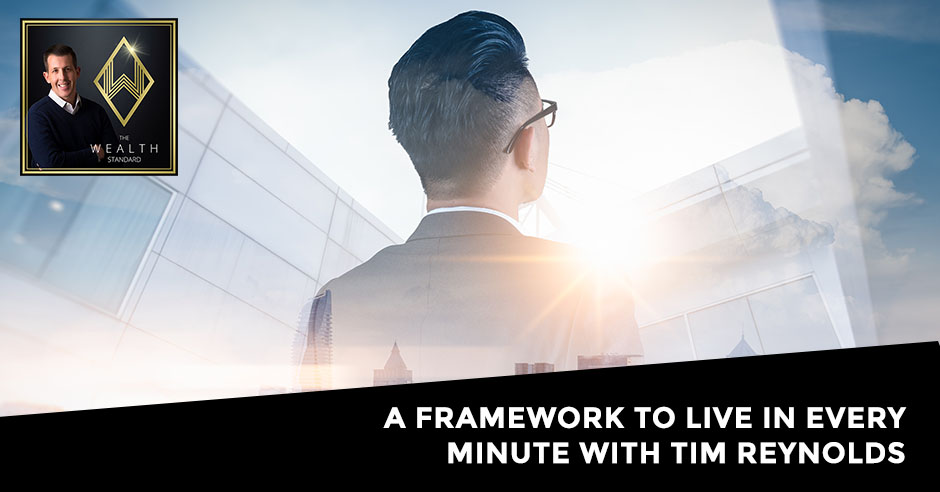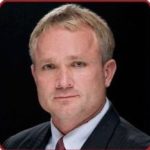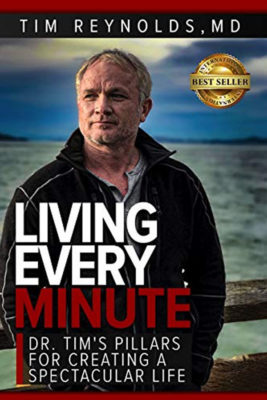A Framework To LIVE In Every Minute With Tim Reynolds
Podcast: Play in new window | Download

Everyone’s lives, be it their personal or professional ones, follow a guide, a framework to live by. In Part 4 of Patrick Donohoe’s interview with businessman, investor, doctor, and author Tim Reynolds, we hear more about how your mission, your framework, affects everything around you. Tim discusses the Living Every Minute concept and how it can change your life. Tim shares the value of writing down the magical moments in your life and chronicling what you do in a journal. Tune in to this thought-provoking conversation and learn how to make the most out of your life.
—
Watch the episode here:
Listen to the podcast here:
A Framework To LIVE In Every Minute With Tim Reynolds
The following five episodes are with Businessman, Investor, Doctor, and Author Tim Reynolds. The interview was in person in my office. If you’re reading the stories and want to watch the videos, just head over to TheWealthStandard.com, and it’ll have a link there when the five segments are complete. We’re going to post the entire interview on our YouTube channel.
A little bit about Tim. He is a former Green Beret in the Special Forces. He was a medic and also Battalion Surgeon. He graduated from Texas A&M with his Medical Degree and his specialization was emergency medicine. He was an emergency room doctor for several years and then co-started a company called HealthCARE Express. He has 15 or 16 locations throughout Texas, Oklahoma, Arkansas, and Louisiana. He has his book. You can check it out on Amazon called Living Every Minute.
It’s also on Audible. He reads the Audible audiobook. Tim is an amazing guy. He is one of the first original platinum partners with Tony Robbins. His love and zest for life are throughout his book. It’s going to be throughout this interview. In the roles that he’s played, he has experienced firsthand the fragility of life. He’s going to share some of those experiences throughout these five segments. I want to forewarn you.
This is a PG 13-ish interview. There’s some colorful language and there are also some relatively graphic stories that Tim tells. You guys are going to experience him, his heart, and his passion for life. You can check his website out. It’s LivingEveryMinute.com. He has some personal development programs, courses and a lot of other resources that you want to check out. Go head over there. Without further delay, let start this episode with my dear friend, Tim Reynolds.
I can’t remember who said this, but picture yourself with them in 30 years and if you can’t. I used to have a funny saying. I don’t even remember where I got it but I heard it one time and I caught it. When I learned something, if I can remember how I learned it, that means I made it up. It’s one of those things. If I wake up three days in a row thinking about you and we’re not having sex, you’re fired.
If you have a mission in life and if you know your major definite purpose is, that has an effect on everything about you. Click To TweetI shouldn’t have to wake up thinking about you for three days in a row unless we’re having sex. I don’t remember where I learned, but I thought it was hilarious. It’s true. I’m sure it’s happened to you. You have a team member, a partner or something, it’s just weighing heavy on your heart. You retrain, rethink and have the hard conversations, then you part ways.
You think, “Why did I wait? Have you ever fired anybody?” I should have waited longer. Every time you’re like, “Why it took me so long?” That’s a sign that you’re a good person. If it weighs heavy on your head, firing so many and you enjoy that, you’re not the right person. If it weighs heavy on your heart and it’s hard, that’s right.
It goes the other direction too, whether it’s an employee or even in an intimate relationship, it becomes non-intimate. You hold on for too long. You know I’m here for a paycheck or I’ll just deal with this. You don’t realize the weight that has on the other aspects of your life.
In the pillars that we talk about, all of them affect the others. Your health affects your wealth. Your wealth affects your relationships. Your revelations affect your mission. If you have a mission in life and if you know what your major definite purpose is, that has an effect on everything about you. My favorite analogy is food poisoning. Everybody had food poisoning. When you have food poisoning, you have the bucket here and the toilet here. Nothing in life matters. Not your marriage, not your money, nothing. Just that bucket, not a toilet.
That’s what people are headed. They’re saying a healthy person has 10,000 problems. A healthy person has one.
It’s the same as the Living Every Minute concept. You don’t appreciate it until you don’t have it. You don’t appreciate your eyesight every day. You get up in the morning and it’s like, “I’m glad I can see you now.” We don’t. We take it for granted. Part of the Living Every Minute philosophy is that, “How do I live every minute? How do I create and appreciate this moment for everything I have?” My hands and my fingers can do this, then you and I consider to have a conversation.
That changes everything and then you start to look for what we call magic moments. We haven’t talked about it. We created a journal planner. It’s called Living Every Minute Journal Planner. We talked about working on your life, so I created a tool. I said, “How can I create a tool that will help people to do this on a daily, weekly, monthly basis?” I created this planner. It has this daily ritual and essentials that you go through.

Living Every Minute: When you have food poisoning, you have the bucket here and the toilet here. Nothing in life matters. Not your marriage, not your money, nothing. Just that bucket, that toilet.
The first thing is three things that you’re grateful for, then the next thing is rewrite your top ten goals. Most people are already have written goals. Most people do write them, then later look at them, but if you rewrite your top ten goals every day, there’s something that happens in your brain, especially if you do it by hand. There’s a place you rewrite them every day. I hate it sometimes because I’m like, “I didn’t do anything on that.”
That’s why you do it. It takes you through this process. It’s not a calendar. There’s a calendar in it but it’s not a calendar. It’s a planning-your-life thing then there’s a journal section on the other side. I teach people who’s like, “I don’t know what to write in a journal.” I said, “It’s pretty easy. We give them a little outline. It’s called Go Pam.” My wife’s name is Pam. It’s gratitude, obstacles and opportunities, people who’ve influenced my life, accomplishments, and magic moments.
Imagine if you just wrote those down every day. The magic moment is you think on the day and you think, “What was cool and magical that happened? Patrick and I were having this conversation and this thing happened or whatever.” You write that as the magic moment, “I spent some time with my daughter, one-on-one laid in the bed and we just talked.” Whatever that’s going to be. This cool thing happens. We’ve taught this over and over. If you write down a magic moment every day, guess what you start looking for?
Magic moments.
You start seeing it, “I got to write that.” You start looking for them and then something magical happens. You start creating them. That’s what I’m about. I’m about creating magic moments. That’s what the train is about. When that happened, I was like, “That’s going to be a magic moment. Let’s create that. We’ll never forget that.”
It’s because of that philosophy. We started thinking, “What if I was the creator of magic moments? Instead of just having a barbecue, we had a barbecue and we invited two of the neighbor families over. We did an anti-roast.” A roast is where you say bad things about people in general so we say great things about. Nobody would ever forget that. It’s just easy to do, but it’s just a matter of twisting it and saying, “I’m wasn’t going to create magic moment. I’m going to create spectacular.”
Two things were going through my head. First, the power of frameworks. An individual’s mind without frameworks is scattered. Naturally, we create our own frameworks, but typically they’re not done strategically. They’re done just by happenstance based on survival instincts. To conserve energy and process everything that’s going on, we create our own framework. This is a strategic framework.
We all have same 24 hours. What you do at these 24 hours makes all the difference. Those who end up successful and those who ended up in the homeless shelter started with the same 24 hours. Click To TweetThe second thing is those frameworks design the way we view the world if we do them on an ongoing basis. If you go to an event and you see Tony Robbins, “I went to that event.” You don’t remember anything about it is because you did nothing with it. Our body were designed where you can’t fit much more information in there. If you don’t repeat, the old stuff is going to dominate anything new. There are instances where you have this like, “Punch in the gut, kick in the balls” moment where if you don’t do something, it’s just going to be super painful. If you’re trying to design things strategically, you need that dynamic of repetition. There’s science behind this.
Atomic habits, the power of habit, and all of these different things. That habit is just a little piece of string, putting our piece string and another piece of string. Pretty soon, you’ve got a rope.
It strengthens.
That’s great if that’s a good one.
It’s terrible if it’s cigarettes or any other bad habit. It’s just so hard to break once it’s a rope. What you just said is perfect. What we did with the journal plan was create a framework. It’s an intentional framework because otherwise, we create an unintentional framework and then we live through those. I’ve realized that’s what we’re doing. That’s where the rules come from. It’s a perfect analogy. I’ve been a big planner guy for a long time. I’m originally from Salt Lake.
There was the Franklin Planner before Covey. There was a guy named Hyrum Smith at a little shop downtown and he invented the Franklin Planner. I bought the first Franklin. We went to the Franklin Planner. It was this little planner and it had all this different stuff. The shop became FranklinCovey because Stephen Covey had a different company. The two join together and become FranklinCovey. Day-Timer came out, so I went to the Day-Timer. I had all these planner ideas. I went to all the courses. Why? I don’t know.
I’ve always been obsessed with this time thing and the idea that no matter who you are, how rich, poor, healthy, or sick you are, we all have one thing the same, 24 hours. Every one of us every day, unless we die, is born with 24 hours. It might be the last 24 hours, but we have 24. I’m fascinated by the idea that what you do at these 24 hours makes all the difference. Those who end up successful in all areas of their life and those who ended up in the homeless shelter started with the same 24 hours.
What they did every 24 hours is what made all the difference. That’s the Living Every Minute. I’ve been obsessed with time. I’ve tried every time-system, planner, and journal, all those kinds of things. Finally, I took all those 30 years’ worth of try-them-once and, “What if I created one that envelops our philosophy?” What the world didn’t need was another calendar. In fact, your best calendar is here. It is recurring, remind you and all that stuff. This isn’t a calendar.
This is a creative stepping out of your life for 10 or 15 minutes a day and recreating it. That comes with the daily and then weekly. There’s a weekly retreat where you spend an hour or so planning the week or what that should look like. It is not planning your events. We call it the most important things. The big rocks, “What am I going to do this week for my health? What am I going to do for my relationship with my wife? If I could only do one thing this week to be a better husband, what would it be? I can only do one thing this week for my business. What would the most important thing I could be?”
It’s putting those in and stepping back. Monthly looks a lot like that and then it comes every quarter. It’s like a 90-day sprint because business is done in 90 days. It’s got a business section and a personal section for the next 90 days. This is the top goal in each of these areas. What you would end up with is about 10 goals and 10 areas of your life. Every day, you have to rewrite those top ten goals for the 90 days. It’s amazing how effective that is.

Living Every Minute: If you’re happy with the results you have, keep doing what you’re doing. But if you’re not happy with the results you have, keeping doing what you’re doing is stupid.
This is more time. I imagine people that are reading this are like, “That’s a lot of time. I’ll don’t have enough time.” It’s amazing how we respond to it. Biologically, our bodies are like, “You have so much going on. Don’t put any more in there,” and it responds that way. In your experience in coaching people and seeing this successfully adopted, what’s the accountability structure in order to get to the point where you do that consistently?
If you and I are going to have a contest to chop down trees for the day, I would spend the first hour sharpening my saw. That’s what Stephen Covey said. I would accomplish a lot more. If we forget to sharpen the saw, we call it the sword. If we forget to sharpen the sword, then we will spend a lot of time doing a lot of things that we don’t have to do with a dull sword. This also the winning the inner battle before you go to the outer belt.
I call it the hour power or whatever you want to call it. If you don’t have an hour, it’s 30 minutes. If you don’t have 30 minutes, it’s 15 minutes, whatever you have. If you spend that time with yourself, planning, thinking, meditating, re-looking at your goals, praying, or whatever it is that you do during your time, the whole rest of the day seems different.
It’s like your, “It’s your day.” Don’t ever feel like you catch up. You feel like you have to it all day. “I ran around with my head on fire, but I didn’t get anything accomplished.” That’s the difference. Once a year, I do four-day hibernation. I’d disappear for four days before I show up. For four days, I plan the year. The first two days, I don’t allow any plans. First two days, all I do is review the previous year.
At the end of the day, what we all want is fulfillment. Click To TweetI do review my journals, my P&L’s for my businesses, and my interviews. What did I do right? What did I do wrong? How did I screw up as a husband? How to do good as a teacher? What could I have done better? It’s such an amazing gratitude exercise for two days, just to look at how the year went and then for the next two days, I have a little pad of paper. As I’m doing it, I’ll write down how next year is and then I spend the next two days thinking, “I going to start with this one question.” When I’m sitting here this time next year, what would have made it spectacular? Three hundred sixty-five days from now, what would have made this the best 365 days ever? That’s the premise I started for and I started outlining health, wealth, relationships, or dad. We have five kids. What could I do? That’s what I do. Once I’ve done that, I’ve outlined what the year looks like.
Some of those things are set in stone. They’re dates. “We’re going to Africa. We’re doing this.” There are so many things I want to accomplish. My mistake that I make often is I just have too many. I ended up with 200 things and because I want to do so many things. I make myself narrow it down and then narrow it down again and go with the top ten. I’ll usually have a top 2 or 3 in each area then the top ten for the year. If I only get these things done this year, these are the top ten.
Once a month, I’ll take for September and say, “This is the first of the month.” I’m going to look at the year, and I’m going to say, “This is September. How am I doing on the things I thought I said I would do? What does September need to look like in order to be in alignment with these?” It takes about an hour once a month. Once a week, I have the weekly laid out. Where do I go check? Every month, I need lots of the year.
Let’s go to September and say, “Where are we at in this month? How do I fit these things into this?” That takes an hour. Once a day, I take ten minutes. The ten minutes I take in the day isn’t really scheduling. That’s the weekly thing. It’s really going through the process that I’ve just told you about. It puts me in a place of harmony with myself and with the world to do that.
I’m sure you know quadrants 1, 2, 3, and 4. I’m more in quadrant two, which are things that are important and not urgent. The more time I can spend in things that are important but not urgent, the more fulfillment you have. All your fulfillment comes from that quadrant. Important and urgent is also important, but important and non-urgent are equal to fulfillments. We don’t need to move from quadrant 1 to 2. We need to move from quadrants 3 and 4 to 2. That’s what it does. By the way, the people who thought, “I don’t have time to do that.” They spend two hours on things and procrastinating.
What are the contingencies? What has to happen in order for that to be successful? I’m going to revert back to hunger, which is the obvious one. That’s the fuel to execute this when you know what’s on the other end of it. Doing this for the sake of doing it, there’s maybe one in a billion people that like doing that. When you start to connect because of this, this is what’s going to happen to my life. This is the moments I’m going to get to live, the places I get to go, the people I get to be with, and the feelings I get to feel. That’s where I look at it again.
I sent you some feedback in a text about the book. It’s so comprehensive because it talks through not just the theory, which we’ve focused on the theory behind it, but it’s how it’s personalized and then what it means for a person’s life. You have the execution. It’s one of those, “You can have all the theory in the world, but do jack shit in your life.” You don’t have a strategy, a framework to execute. If you don’t have it, you’re going to try to use the one that you already have, which will work. That’s why he gave you results you got here. You already have the results from it.
I tell people that. If you’re happy with the results you have, keep doing what you’re doing but if you’re not happy with the results you have, keeping doing what you’re doing is stupid. Don’t keep banging your head into the wall. That doesn’t make any sense. You’ve got to completely change what you’re thinking and what you’re doing to try different strategies. If you don’t use mine, use somebody else’s but use a different strategy. That’s going to get you to where you want to go. At the end of the day, what we really want is fulfillment. We want to be fulfilled in life and feel like, “If you just spent 80% of our misery and our happiness as our relationships with others.”
Important links
- YouTube – The Wealth Standard Podcast
- HealthCARE Express
- Living Every Minute
- Audible – Living Every Minute
- LivingEveryMinute.com
- Living Every Minute Journal Planner
- Franklin Planner
- Day-Timer
About Tim Reynolds
 Dr. Tim Reynolds is the President and CEO of Dr. Tim, International, a company he founded in 2009 to allow him to share his passion for Living Every Minute with others.
Dr. Tim Reynolds is the President and CEO of Dr. Tim, International, a company he founded in 2009 to allow him to share his passion for Living Every Minute with others.
Dr Tim was a graduate of the Special Forces Q-course in July of 1982. He served as a Green Beret medic on an A-Team, as the Battalion medic and eventually as a Special Forces Battalion Surgeon for the 19th Special Forces Group (Airborne). He served both enlisted and as an officer from 1980 until 2000.
Dr. Tim graduated Summa Cum Laude with an MD degree from the University of Utah in 1993. He completed his Emergency Medicine residency at Texas A&M Scott and White in 1996 and is board certified in emergency medicine. Dr. Tim is the managing partner for HealthCARE Express, a group of urgent care clinics rapidly expanding across the United States.
Prior to starting HealthCARE Express in 2006, Dr. Tim held numerous positions across the medical field, including: medical director of the Wadley Regional Medical Center Emergency Department and level II trauma center; director, Texas College of Emergency Physicians Board of Directors; president of E-Med Services, LLP and of E-Med Billing Solutions, LLP; associate clinical professor for the Area Health Education Center at the University of Arkansas; founding member of the Greater People’s Clinic of Texarkana Board of Directors.
Dr. Tim is also an entrepreneur and successful businessman. He is currently the chief executive officer of TL Reynolds Properties, LLP, a real estate investment company; and he is a managing partner of JJET Developments Ltd., a real estate development company.
Dr. Tim enjoys spending time on his Ranch in Atlanta, Texas, where he lives with his wife, Pam, and their five amazing children. He holds a black belt in Tae Kwon Do, is a SCUBA rescue diver, and a pilot. He also enjoys body building, golf, and hiking.
Love the show? Subscribe, rate, review, and share!

















